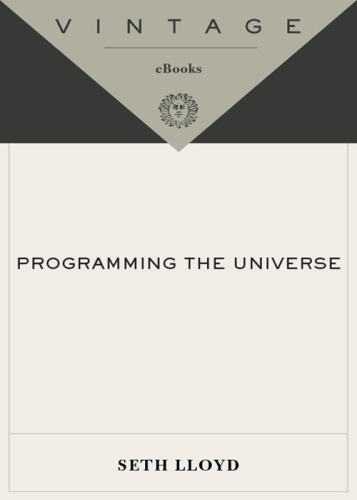
Programming the Universe
A Quantum Computer Scientist Takes on the Cosmos
کتاب های مرتبط
- اطلاعات
- نقد و بررسی
- دیدگاه کاربران
نقد و بررسی

December 12, 2005
Lloyd, a professor at MIT, works in the vanguard of research in quantum computing: using the quantum mechanical properties of atoms as a computer. He contends that the universe itself is one big quantum computer producing what we see around us, and ourselves, as it runs a cosmic program. According to Lloyd, once we understand the laws of physics completely, we will be able to use small-scale quantum computing to understand the universe completely as well. In his scenario, the universe is processing information. The second law of thermodynamics (disorder increases) is all about information, and Lloyd spends much of the book explaining how quantum processes convey information. The creation of the universe itself involved information processing: random fluctuations in the quantum foam, like a random number generator in a computer program, produced higher-density areas, then matter, stars, galaxies and life. Lloyd's hypothesis bears important implications for the red-hot evolution–versus–intelligent design debate, since he argues that divine intervention isn't necessary to produce complexity and life. Unfortunately, he rushes through what should be the climax of his argument. Nevertheless, Lloyd throws out many fascinating ideas. (For another take on information theory, see Decoding the Universe
on p.53.) 12 b&w illus. 100,000 first printing.

February 15, 2006
Lloyd (mechanical engineering, MIT; "Alpha & Omega"), whose work has appeared in "Science" and "Nature" magazines, examines the argument that the laws of quantum mechanics can explain the emergence of detail and structure in the universe. He argues that the physical system of the universe computes itself by registering and transforming information at the most basic level of quantum bits, or qubits. Lloyd attempts to write for an audience with an appreciation of general physics by using simple physical ideas, logic, and pictures. His text is complete with random discussions of quantum phenomena, e.g., weirdness, logic circuits, computability, and entanglement, yet fails to discuss related ontological or philosophical theories. As a quantum bit wrangler, Lloyd has produced a less-than-convincing argument for this theoretical concept. The writing meanders, will confuse many readers, and includes a shameless amount of personal vignettes. Optional at best for most libraries. [See Prepub Alert, "LJ" 12/05.]" -Ian D. Gordon, St. Catharines Lib., Ont."
Copyright 2006 Library Journal, LLC Used with permission.

Starred review from February 15, 2006
Lloyd's specialty in physics is the hot topic of quantum information. And his book may do for quantum information what Brian Greene did for strings (" The Elegant Universe," 1999) and Stephen Hawking did for spacetime (" A Brief History of Time" , 1988): popularize a far-out scientific frontier. Will Lloyd's listeners have the same head-scratching reactions as his MIT students do on their first encounter with the idea that information is a quantifiable physical value, as much as mass or motion? Or with the proposition that any physical system--a river, you, the universe--is a quantum mechanical computer? Not if they've read his book, which offers brilliantly clarifying explanations of the "bit," the smallest unit of information; how bits change their state; and how changes-of-state can be registered on atoms via quantum-mechanical qualities such as "spin" and "superposition." Putting readers in the know about quantum computation, Lloyd then informs them that it may well be the answer to physicists' search for a unified theory of everything. Exploring big questions in accessible, comprehensive fashion, Lloyd's work is of vital importance to the general-science audience. (Reprinted with permission of Booklist, copyright 2006, American Library Association.)

























دیدگاه کاربران